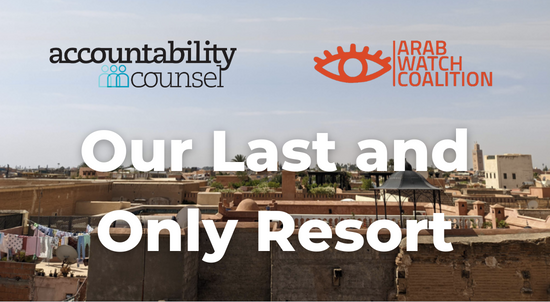NEW REPORT: OUR LAST AND ONLY RESORT

What happens when development goes wrong in the Middle East and North Africa
When development projects cause harm to people or their environments, independent accountability mechanisms (IAMs) tied to international financial institutions (IFIs) receive and respond to complaints from communities. The Middle East & North Africa (MENA) has fewer complaints than any other region, and the lowest rates of complaints being addressed.
In early 2010, farmers in the Chichaoua region of Morocco noticed that their drinking water had become dirty and discolored. A large internationally funded highway project, the Marrakech–Agadir Motorway, was being constructed near their farmland. In addition to water pollution, farmers began to experience other types of harm. Their homes started cracking from the construction and traffic, their farmlands eroded, water streams and traditional dams were damaged, and they had to travel longer distances to get to vital areas.
A civil society organization operating in the area, the Center for Development of the Region of Tensift in Morocco (CDRT), knew that the African Development Bank (AfDB) contributed to funding the project. Further, CDRT knew that the AfDB contained within it an “accountability office” where communities could file official complaints about harm caused by AfDB-financed projects in an effort to remedy damage. The CDRT filed a complaint on behalf of the affected communities to the AfDB’s IAM: the Independent Review Mechanism (IRM). CDRT requested a negotiated solution to the problems the farmers were facing as a result of the project. Five years later, in 2014, the parties reached an agreement that pledged to repair the farmers’ homes, restore agricultural lands, and preserve irrigation catchments. It was a rare victory for the community, in a region where we know harm occurs but these types of complaints are sparse and remedy even more so.
Reflecting back on the process, CDRT President Dr. Ahmed Chehbouni was proud of the organizing and collaboration required to bring tangible remedy to the community. But when the World Bank approached him about supporting another community through a complaint process, he politely declined. “We’re tired. We won’t take it up because we’re exhausted.” Dr. Chehbouni was not the only interviewee who shared this sentiment.
BACKGROUND
Accountability offices tied to international financial institutions were designed to identify, address, and mitigate harm from development projects. These IAMs are relatively new and largely unutilized. However they have already had occasion to demonstrate that, at their best, these systems can provide substantive and meaningful remedy to communities alleging harm from projects financed by international financial institutions (IFIs). Yet the efficacy of these processes ranges widely and depends on a number of factors, including the robustness of the complaint that is submitted, the resources and level of organization of complainant communities, the presence and extent of CSO support, and the location of the project. Other structural factors such as the capability of the IAM to manage the process fairly and effectively, the willingness of the bank to engage with the IAM process, and the threat of retaliation and violence faced by complainants also influence the efficacy of IAM processes.
This report looks at the operations of the IAM ecosystem in the Middle East and North Africa (MENA), the region with both the lowest complaint volume and the second lowest rate of complaint outputs. We seek to understand why complaints in this region fall short relative to others and what can be done to improve accessibility and efficacy of IAMs for impacted communities going forward. This report incorporates the experiences and opinions of almost a dozen communities across five countries, in-depth interviews with IAMs operating in the area, and an analysis of all publicly available complaint and project-related data in the region. Project and complaint data is sourced from the Accountability Console, a comprehensive database created by Accountability Counsel that collects and organizes community complaints filed with IAMs.
The findings of this research highlight a number of factors within the scope of IAMs and IFIs that are limiting both access and efficacy of complaints in the region, as well as other broader structural, governance, and social issues that can be addressed and mitigated through thoughtful and nuanced adjustments to the management of complaints. The learnings from this research can also support impacted communities and their advocates to engage with the IAM system more effectively with a greater likelihood of success.
Though the research below is focused on complaints within a particular geographic region, many of the lessons apply far more broadly. Issues faced in the MENA are also prevalent in other regions, if less acutely. Improvements to accessibility and efficacy of IAMs stand to be improved everywhere but may be most needed in the MENA. We hope the findings from this process will inspire future investigations into other regions, the role of international CSOs and nongovernmental organizations (NGOs), and other factors required to understand and improve the accountability ecosystem in international finance. Such investigations can help the system of accountability to better realize its core principle of ensuring a community voice in the defense of their lands, resources, cultural identities, respect, and dignity.
